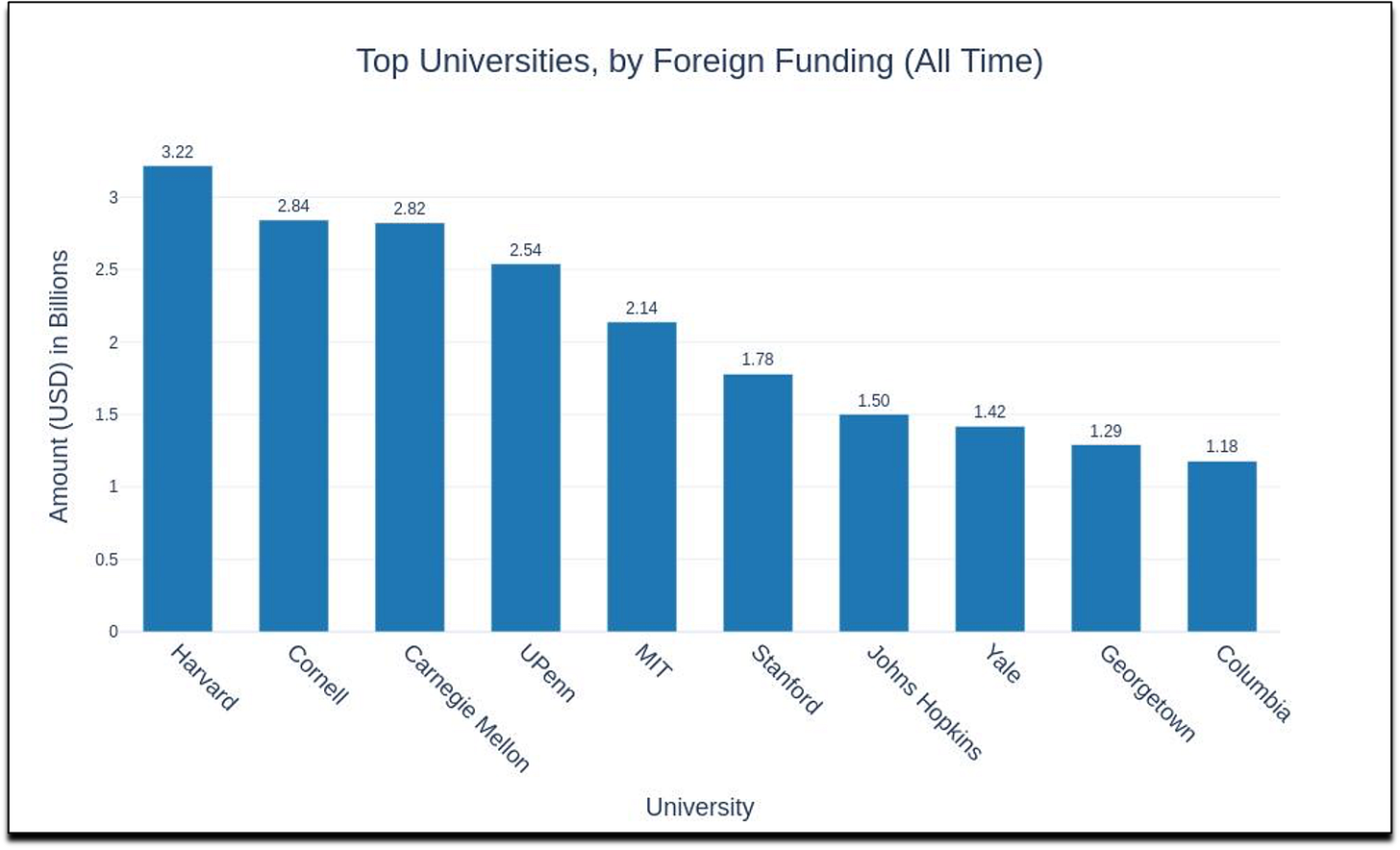BREAKING: Foreign Funding Is Fueling a Crisis on America’s Campuses
New data uncovers a pipeline of foreign cash and public funds fueling radicalization and terrorism on U.S. university campuses.
Reality’s Last Stand is a reader-supported publication. Please consider becoming a paying subscriber or making a one-time or recurring donation to show your support.
About the Author
Dr. Colin Wright is the CEO/Editor-in-Chief of Reality’s Last Stand, an evolutionary biology PhD, and Manhattan Institute Fellow. His writing has appeared in The Wall Street Journal, The Times, the New York Post, Newsweek, City Journal, Quillette, Queer Majority, and other major news outlets and peer-reviewed journals.
Breaking new data has revealed a threat to America’s universities far deeper and more dangerous than previously understood. Exclusive information shared with The Free Press by the Network Contagion Research Institute (NCRI) shows a massive surge of foreign donations—particularly from Qatar, China, and Germany—to American colleges in recent years, with billions flowing into the very institutions now at the center of antisemitism scandals. In a separate case study shared with Reality’s Last Stand, the NCRI documents how public funds have, in at least one major university, been used to platform and promote terrorists and individuals linked to designated foreign terrorist organizations.
Against this backdrop, President Donald Trump has launched an aggressive campaign against the nation’s top universities, accusing them of failing to uphold civil rights, protect women’s sports, defend free speech, and prevent the spread of antisemitism. Now, with these new findings, Trump’s fight has entered a critical new phase: a confrontation over universities’ opaque financial ties that may be compromising their ideological independence and enabling radical, anti-American movements.
Trump’s long-running criticism of elite institutions intensified dramatically after a series of controversies exposed the extent of discrimination and ideological capture on campus. Among his first moves was to threaten universities with the loss of federal funding for discriminatory DEI (Diversity, Equity, and Inclusion) practices that he argued violated the Civil Rights Act (CRA). These programs, Trump and his administration claim, discriminated against white and Asian students and fostered an ideological orthodoxy hostile not only to free inquiry but to reality itself.
One of the first major battles was with the University of Pennsylvania (UPenn), where Trump threatened to withhold federal funds after the university allowed male athletes to compete on women’s sports teams—a move his administration viewed as a direct violation of Title IX and a betrayal of the CRA’s protections based on sex. The battle over free speech erupted at nearly the same time. Top schools like Harvard, Columbia, UPenn, and Georgetown ranked among the worst in the nation for free speech according to the Foundation for Individual Rights and Expression (FIRE), with Harvard finishing dead last—251st out of 251—in both 2023 and 2024.
Although Trump was not in office during the October 7, 2023, Hamas attack on Israel, the explosion of antisemitic hate that followed also fuels his confrontation with academia. The open antisemitism seen during pro-Palestinian protests—and the way colleges failed to protect Jewish students—revealed a crisis that could no longer be ignored. The hypocrisy was especially stark: universities that would have acted fast had any other protected group been targeted instead stood by or even enabled harassment when Jewish students were the victims.
Once back in office, Trump ordered the Department of Education to investigate whether university policies and practices violated the CRA, infringed on free speech, or fostered environments that encouraged antisemitic hate hate and support for terrorism. His strategy was to hold institutions accountable across all these fronts at once: protecting civil rights, restoring free inquiry, and calling out the radicalization happening under the banner of academic freedom.
As Trump’s investigations widened, it became clear that the antisemitism on campus wasn’t just a few bad actors; it was widespread and in many cases baked into the campus culture.
Places like Columbia, Harvard, the University of California schools, Northwestern, and Michigan quickly turned into hotspots for antisemitic harassment, especially during and after pro-Palestinian protests. At Columbia, protesters held signs explicitly targeting Jewish students for violence, shouting slogans like “We are Hamas” and calling Jewish students “dirty Jews.” Some encampments blocked Jewish students from accessing parts of campus. Harvard faced lawsuits alleging “severe and pervasive” harassment of Jewish students, resulting in a settlement that required mandatory antisemitism training.
The scale of problem was alarming. Hillel International reported a 700 percent increase in antisemitic incidents from 2022 to 2023. A 2024 survey found that 73 percent of Jewish students had personally witnessed or experienced antisemitism on campus in fall 2023 alone.
It is inconceivable that such behavior would have been tolerated if, for example, white supremacists had blocked black students from accessing parts of campus. But because this harassment was wrapped in the language of activism and free speech, universities hesitated—or even encouraged—the harassment when Jewish students were the target.
All of this raises a bigger, more unsettling question: Was there something deeper driving this radicalism?
The answer began to emerge with new data on foreign funding.
In April 2025, Trump signed an Executive Order forcing universities to be fully transparent about foreign funding. Universities would now be required to disclose the source, amount, and purpose of any foreign gift exceeding $250,000 or face audits, investigations, and losing federal grants. The order was meant to finally enforce Section 117 of the Higher Education Act of 1965, which had been mostly ignored.
Newly released data revealed a staggering surge in foreign funding under the Biden administration. From 2021 to 2024 alone, American universities pulled in $28.96 billion in foreign gifts—more than double the amount received during Trump’s first term ($13.72 billion) and exceeding all foreign money received over the previous 40 years combined.
Even more alarming, yet perhaps unsurprising, the institutions that received the most foreign funding shared tremendous overlap with those engulfed in antisemitism scandals: Harvard University, Cornell University, Carnegie Mellon University, University of Pennsylvania, Stanford University, Johns Hopkins University, Yale University, Georgetown University, and Columbia University.
Exclusive data shared with The Free Press by NCRI shows:
Qatar is the largest source of foreign donations to U.S. universities since reporting began in 1986, giving $6.3 billion.
Over the last four years, Germany gave $3.3 billion (including a $467 million settlement to UPenn), followed by China ($2.3 billion), Qatar ($2 billion), and Saudi Arabia ($1.9 billion).
Nearly a third of Qatar’s total donations—over $2 billion—were made between 2021 and 2024.
Chinese donations also surged, with $2.3 billion flowing into U.S. universities from 2021 to 2024.
China is the top overseas donor to elite schools like Harvard, Columbia, and Stanford.
The pattern is hard to miss: the universities most tolerant of antisemitic protests are the ones flush with foreign cash.
Could foreign governments be using donations to quietly push anti-American and antisemitic ideas on campus, hiding behind the language of social justice?
The circumstantial evidence keeps growing. But what we need is hard proof.
That proof just arrived in a new intelligence report titled “Foreign Terror Pipelines in the Academy: The Case Study of SFSU and Dr. Rabab Abdulhadi,” published by NCRI and shared with Reality’s Last Stand.
San Francisco State University (SFSU), a publicly funded institution with about 22,000 students, had long faced accusations of antisemitism. Lawsuits in 2017 had already forced the university into settlements over the treatment of Jewish students. But instead of cleaning things up, SFSU’s Arab and Muslim Ethnicities and Diasporas Studies (AMED) program, run by Dr. Rabab Abdulhadi, got even worse—turning into what NCRI describes as a radicalization pipeline linked to designated Foreign Terrorist Organizations (FTOs).
Since 2020, AMED used public money to host “open classrooms” and webinars featuring convicted terrorists and affiliates of groups like Hamas, Palestinian Islamic Jihad (PIJ), and the Popular Front for the Liberation of Palestine (PFLP)—all designated FTOs under U.S. law.
Among those platformed were:
Leila Khaled, who hijacked two commercial airliners for the PFLP.
Sami Al-Arian, who pled guilty to providing material support to Palestinian Islamic Jihad.
Shuruq Dwaiyat, convicted of stabbing Israeli civilians.
Wisam Rafeedi and Salah Salah, both senior figures in the PFLP.
These were not academic discussions about terrorism, but events that praised and celebrated individuals whose life work centered on violence against civilians. University-sponsored events normalized their actions and glorified their “resistance” narratives to a captive audience of students, many of whom had no idea just how serious these people’s backgrounds really were.
Personnel overlap was rampant. Graduate assistants and professors affiliated with AMED also held leadership roles within extremist movements like the Palestinian Youth Movement (PYM). Abdulhadi herself maintained close ties with The People’s Forum, a New York nonprofit identified as operating with CCP-linked funding.
NCRI’s report made it clear: this wasn’t just a few bad events, but part of AMED’s core operations. Terrorist operatives were platformed through official university communications channels like SFSU’s Facebook and YouTube accounts. Taxpayer money was literally being used to push terrorist propaganda, all under the misleading cover of academic freedom.
In one particularly egregious event, AMED hosted a webinar featuring Shuruq Dwaiyat—celebrating her as a “freedom fighter” after she was released in an Israel-Hamas prisoner swap. In another, they platformed Ahmed Abofoul, a legal adviser to al-Haq, an NGO the Israeli government says operates on behalf of the PFLP.
These weren’t lapses of judgement rooted in ignorance. It was a deliberate strategy to use the prestige of a public university to legitimize and promote violent extremist ideologies.
This was not free speech. It was the weaponization of academia.
The implications of the SFSU case—and the broader foreign influence uncovered across American universities—cannot be overstated.
Universities have become soft targets for foreign adversaries to wage ideological warfare against the United States. Jewish students are being harassed with little recourse. Public trust in academic institutions is eroding as universities abandon principles of free inquiry in favor of ideological orthodoxy often backed by hostile foreign governments.
Trump’s aggressive approach—particularly his emphasis on transparency and accountability—is not only justified but necessary. Without strong oversight and enforcement, American universities risk becoming fully captured, promoting ideologies antithetical to American values or interests.
Transparency alone will not cut it. Universities that platform terrorist sympathizers, discriminate against Jewish students, or suppress free speech must face serious consequences—whether through the loss of federal funding, removal of nonprofit status, or criminal prosecution under anti-terror statutes.
The time for warnings is over. It’s time for accountability.
You made it to the end! Please consider upgrading to a paid subscription or making a recurring or one-time donation below to show your support. Reality’s Last Stand is a reader-supported publication, and your help is greatly appreciated.














I don’t know about the others off hand, but the $467M to Penn “from Germany” is actually a payment from BioNTech (a German company) in settlement of a lawsuit against it regarding royalties owed under an IP license.
https://www.reuters.com/business/healthcare-pharmaceuticals/biontech-enters-settlement-with-us-agency-upenn-over-covid-vaccine-royalties-2024-12-27/
Can I just for one second say "no duh?!"